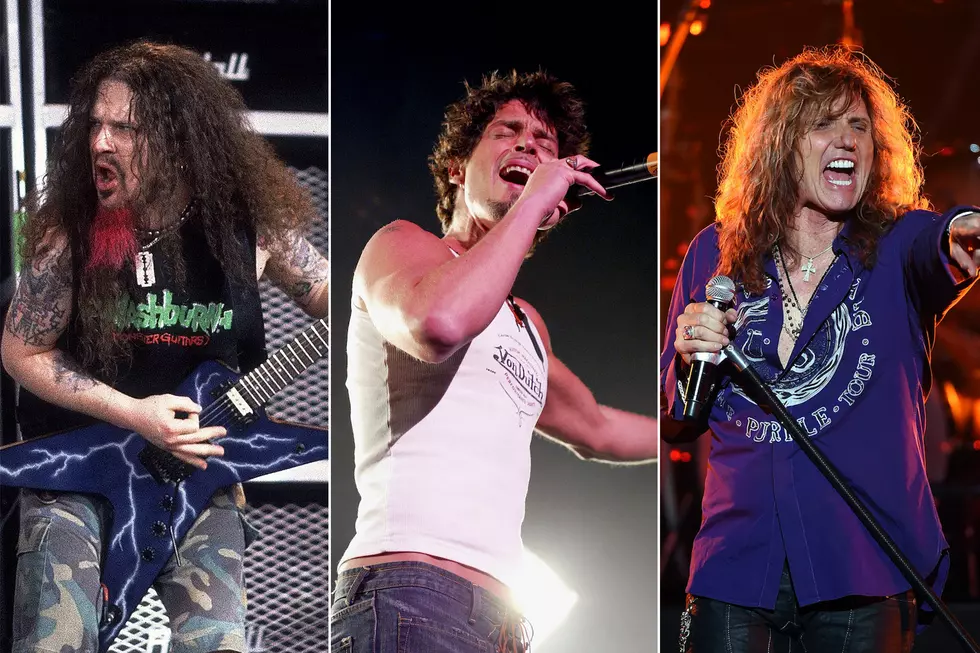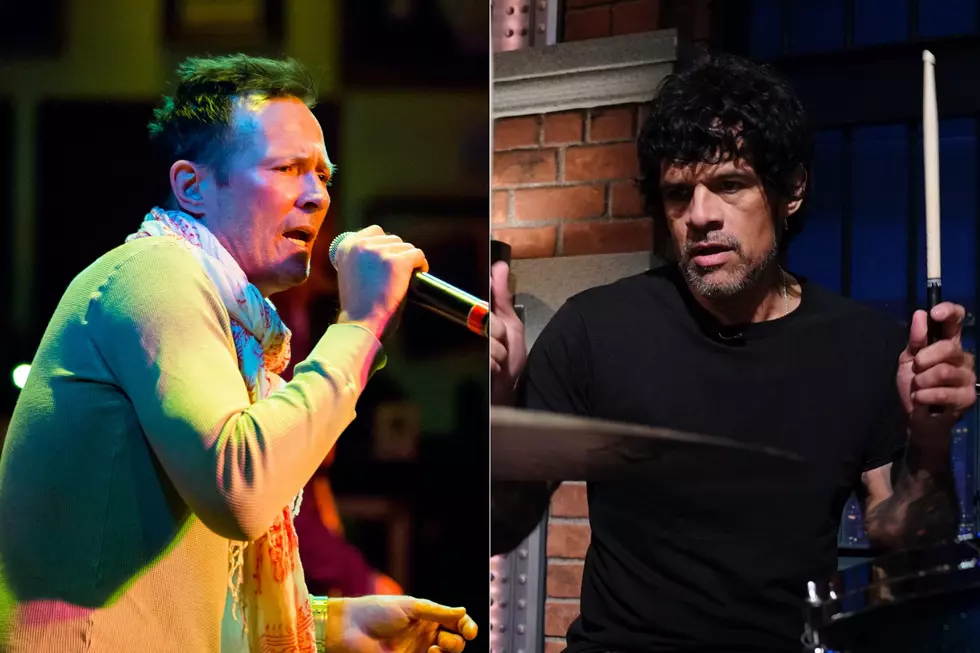
7 Years After His Death, What’s Scott Weiland’s Legacy?
On Dec. 3, 2015, Scott Weiland was found dead on his tour bus, bringing an abrupt and tragic end to his complicated career.
The singer rose to stardom in the ‘90s as the frontman of Stone Temple Pilots, who formed in San Diego and made a name for themselves in the local music scene before signing with Atlantic Records. The band mixed glam-rock influences with modern grunge sounds, creating a style that was both dynamic and appealing to mainstream audiences.
The group quickly became one of the bestselling bands of the ‘90s. Across that decade, Stone Temple Pilots released four albums - Core, Purple, Tiny Music ... Songs From the Vatican Gift Shop and No. 4 - selling a total of more than 17 million copies in the U.S. alone.
To put it into perspective, across that time span STP sold more albums than such vaunted acts as Aerosmith, Radiohead, Oasis, Rage Against the Machine, Weezer and U2.
Watch Stone Temple Pilots' 'Plush' Video
As high as the band was soaring, the new millennium brought a precipitous fall. Although 2001’s Shangri-La Dee Da still did moderately well, earning gold sales status, it paled in comparison to the band’s previous efforts. The group soon broke up, due largely to Weiland’s drug addiction. His frequent use led to manic behavior, arrests and infighting with bandmates.
Cocaine had been part of the rocker’s life since high school, but it was heroin that he embraced in stardom. “There was always an intrigue for me when it came to heroin,” the singer admitted in a 2005 interview with Esquire. "Most of my musical and artistic heroes were connected to dope. Everyone from William Burroughs to Keith Richards and Gram Parsons to Bird, all the jazz greats — if you listen to the fluidity of that music, you can hear heroin in that music.
"There was something about it that I was definitely drawn to. I wondered why this substance had so much powerful appeal, had such a power to affect music and art and lives in such a way that seemed to be so beautiful but also so dark and destructive at the same time. Those two elements, the beauty and the darkness, are what created that seduction for me.”
Watch Stone Temple Pilots' 'Interstate Love Song' Video
After the disbandment of STP - and another attempt to get clean - it seemed that the singer had again landed on his feet with the arrival of Velvet Revolver, a supergroup featuring Weiland and former members of Guns N’ Roses.
“I just thought he was a great singer, and he'd always been on my mind for [Velvet Revolver],” Slash said of Weiland in his autobiography.
“He was the one vocalist that I knew had the kind of voice that would serve what we were going to do: He had a John Lennon-ish quality, a little bit of Jim Morrison and a touch of almost David Bowie. He was the best singer to come out in a long time, in my opinion.” Even though 2004’s Contraband was a multiplatinum success for Velvet Revolver, their follow-up, 2007’s Libertad, failed to live up to expectations. The group soon disbanded, again weighed down by Weiland’s drug abuse.
Watch Velvet Revolver's 'Slither' Video
From there, the rocker ventured into a largely unsuccessful solo career. With each of these failed releases - a poorly executed cover album or disappointing acoustic effort - Weiland’s glorious heights with Stone Temple Pilots faded further in the rearview mirror.
Even though the singer rejoined STP in 2010 for a new album and extensive touring, they were unable to rekindle the fire that made them great. Weiland played his final show with the band in 2012, fired for the last time shortly afterward.
A little more than three years later, he would be dead, the result of an accidental overdose.
"It was a feeling I had never experienced," STP guitarist Dean DeLeo admitted to Billboard of the moment he was told about Weiland's death. "My heart dropped. It felt like a part of me fell out."
"He was so tenacious in his lust for life in the early years," STP drummer Eric Kretz recalled to Rolling Stone. "I really hoped he would come back — and have a second chance."
Weiland's death sent shockwaves through the music world. Billy Idol remembered him as a “super-talented” musician who “owned the stage.” Aerosmith’s Joe Perry called him a “gifted performer,” while Myles Kennedy described Weiland as “a captivating frontman who had a gift for writing great melodies.”
In a heartfelt eulogy posted to his blog, Billy Corgan noted that Weiland’s phrasing and delivery “pushed his music into a unique, and hard-to-pin-down, aesthetic sonicsphere.” The Smashing Pumpkins frontman went on to confess: “If you asked me who I truly believed were the great voices of our generation, I'd say it were he, Layne [Staley] and Kurt [Cobain].”
Watch Stone Temple Pilots' 'Creep' Video
Despite these and many other posthumous honors, Weiland’s legacy remains cloudy. Although Stone Temple Pilots achieved massive commercial success, they're often regarded as a second-tier act of the ‘90s, well behind such revered acts as Nirvana, Pearl Jam and Soundgarden.
Indeed, it’s intriguing to compare Weiland’s career to that of the latter band’s frontman, Chris Cornell. Both men experienced meteoric rises in the ‘90s fronting hugely successful bands. Both singers enjoyed second acts with supergroups - Weiland with Velvet Revolver, Cornell with Audioslave. Both men struggled in their solo careers, though Cornell can definitely boast better sales numbers. And both men died far too soon. Yet, why is Cornell held in rarefied rock air while Weiland is the more forgotten frontman?
In a Vanity Fair article published immediately after Weiland’s death, author Maura Johnston noted that STP were often unfairly lumped in with grunge copycats, rather than their more direct influences such as Bowie and the Beatles. In Johnston’s view, Weiland was key to STP’s “shape-shifting” between various rock styles: “When he was on, he was absolutely magnetic, his wiry frame becoming electrified by the rhythms backing him up. He was a shrewd observer of his peers’ showmanship, and he went for it with the type of zeal that was often viewed with suspicion by the denizens of alternative nation.”
Watch Stone Temple Pilots' 'Sour Girl' Video
Future Rock Legends, a site specializing in predicting the nominations and inductions for the Rock & Roll Hall of Fame, suggests Stone Temple Pilots could be inducted as soon as 2021. While that prediction feels like a stretch, considering like-minded but more critically hailed acts - Soundgarden, Rage Against the Machine and Sonic Youth - have yet to be enshrined, there’s no denying the overwhelming commercial success STP enjoyed.
Still, it’s impossible to remove Weiland’s achievements from his demons, as any conversation about the late rocker inevitably involves his many addictions. In that way, the singer's legacy becomes less about what was and more about what could have been.
"His body had suffered an enormous amount of abuse - that's no secret. But he was not done," Jamie Weiland, Scott’s widow, admitted to Billboard. "The notion that we're not supposed to 'glamorize him' [because he did drugs]? Fuck that. He's an icon."
Top 30 American Classic Rock Bands of the '90s
More From 95 Rock










